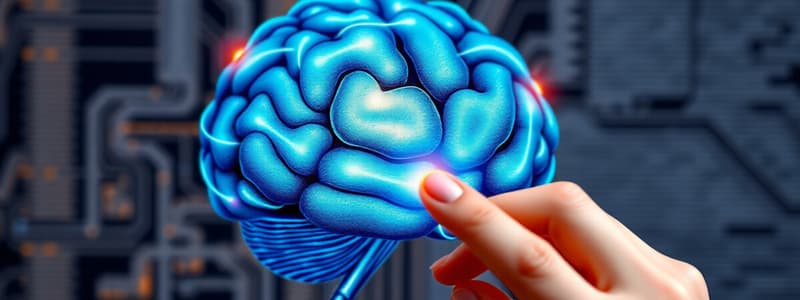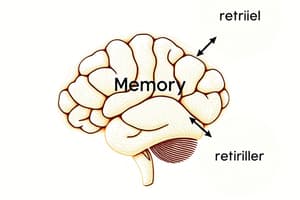Podcast
Questions and Answers
Which type of long-term memory is specifically related to personal events?
Which type of long-term memory is specifically related to personal events?
- Procedural Memory
- Episodic Memory (correct)
- Short-Term Memory
- Semantic Memory
Strong emotions can lead to weaker memories.
Strong emotions can lead to weaker memories.
False (B)
What process involves filling in gaps in memories based on prior experiences and expectations?
What process involves filling in gaps in memories based on prior experiences and expectations?
Reconstructive Memory
The type of memory that includes knowledge about facts, like what a bicycle is, is called __________ memory.
The type of memory that includes knowledge about facts, like what a bicycle is, is called __________ memory.
Match the memory improvement technique with its description:
Match the memory improvement technique with its description:
Which type of memory holds information for an initial brief period?
Which type of memory holds information for an initial brief period?
Long-Term Memory primarily encodes information visually.
Long-Term Memory primarily encodes information visually.
What is the main function of the Central Executive in the Working Memory Model?
What is the main function of the Central Executive in the Working Memory Model?
Retrieval ________ are stimuli that help retrieve memories.
Retrieval ________ are stimuli that help retrieve memories.
Match the memory models to their characteristics:
Match the memory models to their characteristics:
Which encoding method is typically the most effective for long-term storage?
Which encoding method is typically the most effective for long-term storage?
Proactive interference occurs when newly learned information interferes with recollection of old information.
Proactive interference occurs when newly learned information interferes with recollection of old information.
What is motivated forgetting, also known as repression?
What is motivated forgetting, also known as repression?
Flashcards
Episodic Memory
Episodic Memory
Memory for personal events, like your first birthday party.
Semantic Memory
Semantic Memory
Memory for general knowledge, like knowing the capital of France.
Procedural Memory
Procedural Memory
Memory for how to do things, like riding a bike.
Reconstructive Memory
Reconstructive Memory
Signup and view all the flashcards
Rehearsal
Rehearsal
Signup and view all the flashcards
Sensory Memory
Sensory Memory
Signup and view all the flashcards
Short-Term Memory (STM)
Short-Term Memory (STM)
Signup and view all the flashcards
Long-Term Memory (LTM)
Long-Term Memory (LTM)
Signup and view all the flashcards
Acoustic Encoding
Acoustic Encoding
Signup and view all the flashcards
Visual Encoding
Visual Encoding
Signup and view all the flashcards
Semantic Encoding
Semantic Encoding
Signup and view all the flashcards
Multi-Store Model (MSM)
Multi-Store Model (MSM)
Signup and view all the flashcards
Working Memory Model (WMM)
Working Memory Model (WMM)
Signup and view all the flashcards
Study Notes
Types of Memory
- Sensory Memory: A brief, initial recording of sensory information; iconic (visual) and echoic (auditory).
- Short-Term Memory (STM): Limited capacity store holding information briefly (around 30 seconds) unless rehearsed. Information encoded mainly acoustically.
- Long-Term Memory (LTM): A relatively permanent and limitless storehouse of the memory system. Encodes information semantically (meaning-based).
Encoding in Memory
- Acoustic Encoding: Encoding information based on sounds.
- Visual Encoding: Encoding information based on imagery.
- Semantic Encoding: Encoding information based on meaning. Semantic encoding is the most effective for long-term storage.
Models of Memory
- Multi-Store Model (MSM): Memory consists of three stores: sensory register, short-term store, and long-term store; information flows linearly.
- Sensory Register: Holds sensory information briefly.
- Short-Term Store (STS): Information retained briefly via rehearsal.
- Long-Term Store (LTS): Information stored permanently unless forgotten.
- Working Memory Model (WMM): STM is not a single store, but a dynamic system with multiple components.
- Central Executive: Supervises and allocates resources to other components.
- Phonological Loop: Deals with auditory information (inner ear and inner voice).
- Visuospatial Sketchpad: Handles visual and spatial information.
- Episodic Buffer: Integrates information from other components and LTM.
Retrieval of Memories
- Retrieval Cues: Stimuli triggering memory retrieval (words, images, emotions).
Forgetting
- Proactive Interference: Previously learned information hinders learning new information.
- Retroactive Interference: New information interferes with recalling old information.
- Retrieval Failure: Inability to access stored information due to lack of cues.
- Motivated Forgetting (Repression): Unconsciously pushing negative memories out of awareness for emotional protection.
Types of Long-Term Memory
- Episodic Memory: Memory for personal events (e.g., first day of school).
- Semantic Memory: Memory for general knowledge (e.g., definition of a bicycle).
- Procedural Memory: Memory for how to do things (e.g., riding a bicycle).
Factors Affecting Memory
- Emotional State: Emotions influence encoding and retrieval; strong emotions create stronger memories.
- Anxiety: High anxiety can impair memory.
- Context: Learning environment influences memory retrieval.
- Distraction: Distractions during learning hinder memory encoding.
Eyewitness Testimony
- Reconstruction of Memory: Eyewitness accounts are often inaccurate due to leading questions or post-event information. Memories are actively constructed, not passively recorded.
- Reconstructive Memory: Filling memory gaps based on prior experiences and expectations, leading to eyewitness errors.
Improving Memory
- Rehearsal: Repeating information to improve retention.
- Elaboration: Connecting new information to existing knowledge for stronger associations.
- Mnemonics: Memory aids (acronyms, visual imagery).
- Organization: Structuring information meaningfully (e.g., using categories).
- Retrieval Practice: Actively recalling information to enhance long-term retention.
Studying That Suits You
Use AI to generate personalized quizzes and flashcards to suit your learning preferences.




